June 13, 2025 | 10:03 GMT +7
June 13, 2025 | 10:03 GMT +7
Hotline: 0913.378.918
June 13, 2025 | 10:03 GMT +7
Hotline: 0913.378.918
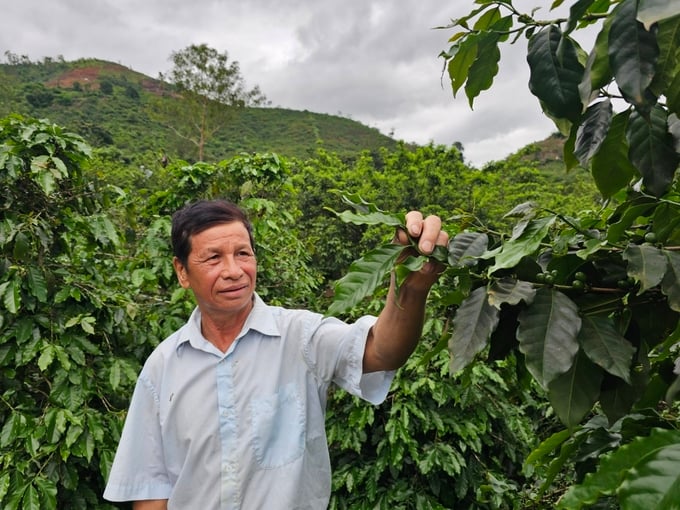
Mr. Quang Van Man, a pioneer in smart coffee farming in Lua village (Hua La commune, Son La city). Photo: Hoang Anh.
Mr. Quang Van Man, the head of Lua village in Hua La commune, Son La city for over 20 years, guided me up the vast arabica coffee hills, intercropped with plums, mangoes, and longans. As we walked, he shared the story of how the Thai community here began growing arabica coffee in the 1990s, when the Son La Tea – Coffee and Fruit Company introduced it to replace cassava and corn crops.
Following the company's dissolution, some villagers resumed the cultivation of cassava and maize, while others transitioned to fruit trees. Nevertheless, Lua village maintained its attachment to coffee. For decades, approximately 75 hectares of coffee provided sustenance to numerous households. Coffee was their primary source of income, as they could not cultivate cornfields or rice paddies. This enabled them to construct well-maintained homes, and gardens, and purchase vehicles and domestic items.
Coffee producers in Hua La have encountered numerous obstacles in recent years. Mr. Man clarified that the flowering of coffee has been impeded by droughts, prolonged cold periods, and frost. The coffee plantations of Son La are characterized by their steep slopes, which result in substantial erosion and nutrient runoff. Farmers' dependence on single-type fertilizers led to inadequate soil nutrition, which resulted in leaf burn, fruit drop, small beans, and root maladies in coffee plants. Mr. Man, who sounds like a scientist, acknowledged the problems, but he also emphasized the importance of the villagers' prompt action.
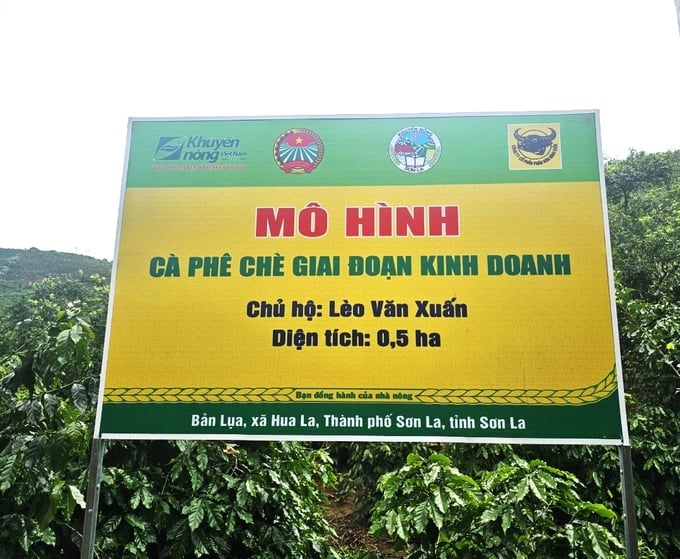
Model of smart coffee farming adapting to climate change. Photo: Hoang Anh.
In 2023, Son La sent a team to the National Farmers' Competition in the Central Highlands. Winning first prize earned them a technical package for climate-smart coffee cultivation worth 100 million VND from Binh Dien Fertilizer Joint Stock Company. Soon after, this climate-smart coffee cultivation model was implemented in Lua village. Mr. Quang Van Man, along with Leo Van Khe and Leo Van Xuan, were the pioneers, applying the model to nearly 3 hectares.
The objective was to enhance soil fertility, reduce greenhouse gas emissions and costs, increase producers' income, and develop a climate-resilient coffee cultivation process. Mr. Man, Mr. Khe, and Mr. Xuan expressed their enthusiasm with the statement, "The difference is apparent."
The households in Lua village in the model began to rehabilitate and revitalize their hillside gardens after attending training sessions and acquiring additional knowledge on the proper and effective use of fertilizers and pesticides, as well as learning to apply scientific techniques to planting and intensive farming to improve coffee productivity and quality.
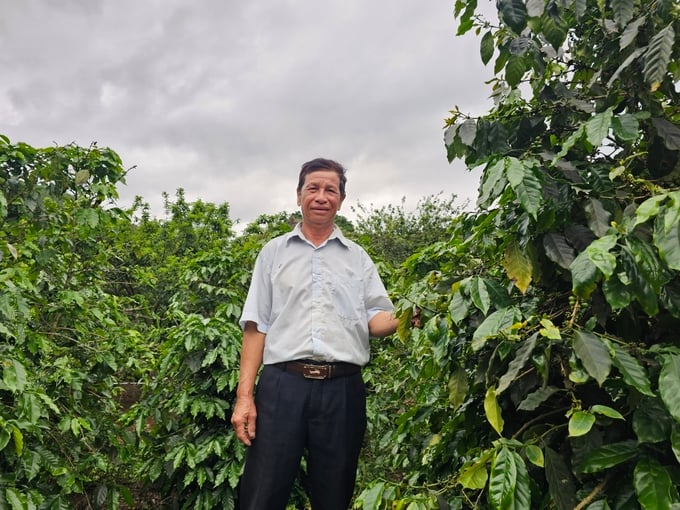
The Arabica coffee garden in Lua village has been revived. Photo: Hoang Anh.
Agricultural extension officers from Son La province and technical staff from Binh Dien Fertilizer Joint Stock Company directly provided the villagers with counsel and guidance on integrated nutrient management, pest control for tea coffee gardens, pruning techniques, and canopy management respectively. Lua villagers were provided with answers to inquiries regarding the proper use of pesticides and fertilizers, as well as insect control, by scientists, experts, and technical staff from the Son La Provincial Agricultural Extension Center, the Son La Provincial Farmers' Association, and enterprises on a weekly and monthly basis.
Within a short period, the gardens of Mr. Man, Mr. Khe, and Mr. Xuan underwent a significant transformation in comparison to those of the neighboring households.
The former head of Lua village aspires to extend the successful model to more than 5,000 hectares of Arabica coffee in Son La city, which includes Hua La, Chieng Den, Chieng Cọ, Chieng Ngan communes, and Chieng An and Chieng Sinh wards.

Son La agricultural extension officers instruct people to prune coffee branches in Lua village. Photo: Hoang Anh.
Additionally, a representative of Binh Dien Fertilizer Joint Stock Company stated: In June 2023, the climate-smart coffee cultivation program for the 2023-2025 period was initiated in five Central Highlands provinces. The program encompasses 15 critical districts for the cultivation of pure coffee and the intercropping of durian and pepper.
The program's objective is to create a comprehensive technical package that will assist producers who cultivate pure coffee or intercrop coffee with durian and pepper in acquiring practical, scientific knowledge. This will help to enhance productivity and quality, reduce greenhouse gas emissions, minimize negative environmental impacts, and increase income associated with green growth.
The province of Son La is the largest producer of Arabica coffee in Vietnam, with a fresh fruit harvest exceeding 400,000 tons annually and an area exceeding 20,000 hectares.
The Son La Department of Agriculture and Rural Development has reported that the agricultural restructuring project has consistently enhanced the quality and yield of Son La coffee to comply with industry standards and regulations. Son La identified two high-tech coffee growing areas in 18 villages throughout Chieng Ban, Chieng Chung, and Chieng Dong communes in Mai Son district in 2022. These areas include more than 1,500 households.
The province has exported more than 28,800 tons of green coffee beans to the EU, North America, and Middle Eastern markets, resulting in a value of 82.3 million USD.. The export volume is anticipated to reach 31,500 tons in 2023, with an estimated export value of 83.1 million USD.
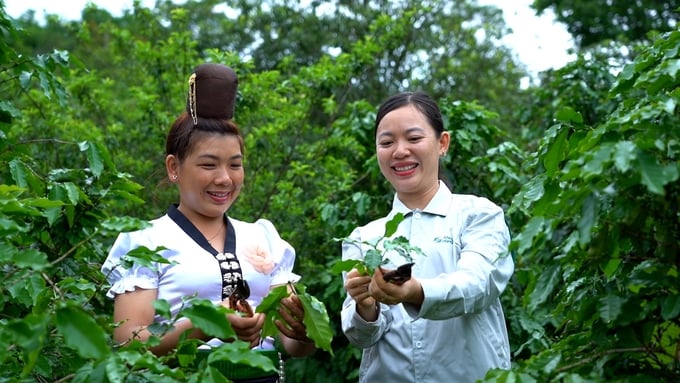
Son La community extension officers instruct Thai people in Lua village to care for Arabica coffee and tea. Photo: Hoang Anh.
At present, more than 16,700 hectares of coffee in Son La have been certified by a variety of sustainable and equivalent standards, including organic coffee, Rainforest Alliance (RA), and 4C coffee. In addition to the climate-smart coffee cultivation model, the Son La Agricultural Extension Center is partnering with the German International Cooperation Organization (GIZ) to execute the project "Developing Arabica Coffee Replanting Models, Training Farmers, and Providing Other Support for Arabica Coffee Production to Enhance Climate Change Resilience."
The initiative has conducted 10 training sessions for 300 participants in Mai Son and Thuan Chau districts, according to Mr. Cong Xuan Ngoc, Director of the Son La Agricultural Extension Center, on the topics of Arabica coffee planting, care, and pruning techniques.
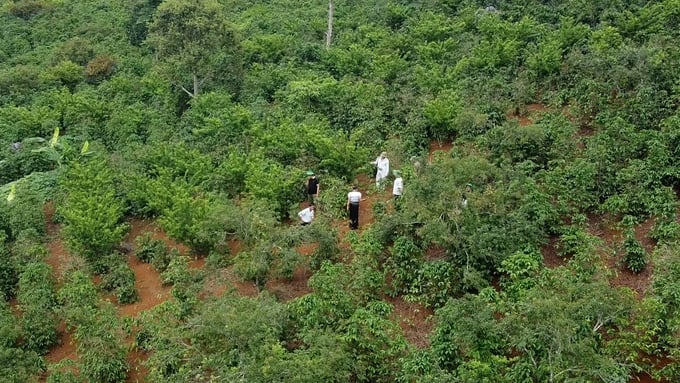
Intercropping coffee beans and plums in Hua La commune. Photo: Hoang Anh.
The Center will persist in its efforts to collect requirements, conduct training sessions, and disseminate sustainable Arabica coffee cultivation methods that are climate-smart. The quality and value of Son La coffee products will be progressively enhanced and improved by the Center's technical guidance classes, which will be tailored to each stage of coffee development.
Translated by Linh Linh
/2025/06/12/3721-2-202745_83.jpg)
(VAN) TH made an impression at Seoul Food 2025 with its line of natural beverages, paving the way for Vietnamese food products to enter the South Korean market.

(VAN) Soc Trang's success in rice exports stems from a strategy of developing fragrant and specialty rice cultivation areas and standardizing production toward low-emission practices.
/2025/06/11/1311-5-120811_839.jpg)
(VAN) The pig farming industry is facing the challenge of comprehensive restructuring to meet requirements for quality, safety, traceability, and market expansion both domestically and for export.

(VAN) Vietnam considers participating in ALGROALBA in order to expand agricultural production, coordinate the assessment and effective exploitation potential land.
/2025/06/05/5314-1-184727_407.jpg)
(VAN) From seemingly worthless fish scales and skin, enzymes and lactic ferments can transform by-products into peptides, opening a sustainable, effective business direction and elevating Vietnamese seafood.

(VAN) TTC AgriS and IFC signed a strategic partnership to develop a sustainable agricultural value chain, aiming to achieve the Net Zero target by 2035.

(VAN) Seafood by-products are opening a new path, combining green growth and technological innovation to enhance the industry's value.